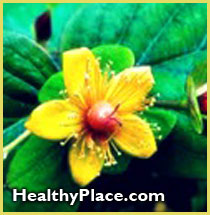St. John's Wort and the Treatment of Depression
St. John's Wort is an alternative treatment for depression. Read all about St. John's Wort and the treatment of depression.
The National Center for Complementary and Alternative Medicine (NCCAM) has developed this fact sheet on the use of St. John's wort for depression. It is one of a series of fact sheets intended to help consumers make informed decisions about whether to use complementary and alternative medical (CAM) therapies for a disease or medical condition. NCCAM defines CAM practices as those health care and medical practices that are not currently part of conventional medicine. There are many CAM practices. A few examples include traditional Chinese medicine, meditation, chiropractic, therapeutic touch, and herbs.
Key Facts About St. John's Wort
St. John's wort is an herb that has been used for centuries for medicinal purposes, including to treat depression. The composition of St. John's wort and how it might work are not well understood. There is some scientific evidence that St. John's wort is useful for treating mild to moderate depression. However, recent studies suggest that St. John's wort is of no benefit in treating major depression of moderate severity. More research is required to help us know whether St. John's wort has value in treating other forms of depression. St. John's wort interacts with certain drugs, and these interactions can be dangerous. Herbal products vary greatly as to their chemical composition and quality.
For Your Safety
The information in this fact sheet is not a substitute for professional medical advice. It is important that you seek the advice of a health care practitioner about any medical condition or symptom you are having, or if you are considering taking any herbal preparation. St. John's wort can interact with prescribed drugs and affect how well they work.
Frequently Asked Questions About St. John's Wort
What is St. John's Wort?
 St. John's wort (Hypericum perforatum in Latin) is a long-living plant with yellow flowers. It contains many chemical compounds. Some are believed to be the active ingredients that produce the herb's effects, including the compounds hypericin and hyperforin.
St. John's wort (Hypericum perforatum in Latin) is a long-living plant with yellow flowers. It contains many chemical compounds. Some are believed to be the active ingredients that produce the herb's effects, including the compounds hypericin and hyperforin.
How these compounds actually work in the body is not yet known, but several theories have been suggested. Preliminary studies suggest that St. John's wort might work by preventing nerve cells in the brain from reabsorbing the chemical messenger serotonin, or by reducing levels of a protein involved in the body's immune system functioning.
For what medicinal purposes has St. John's wort been used?
St. John's wort has been used for centuries to treat mental disorders as well as nerve pain. In ancient times, doctors and herbalists (specialists in herbs) wrote about its use as a sedative and treatment for malaria as well as a balm for wounds, burns, and insect bites. Today, St. John's wort is used by some people to treat mild to moderate depression, anxiety, or sleep disorders.
What is depression?
Click here for comprehensive information on depression. Here is a brief overview.
Depression is a medical condition that affects nearly 19 million Americans each year. A person's mood, thoughts, physical health, and behavior all may be affected. Symptoms commonly include:
- Ongoing sad mood
- Loss of interest or pleasure in activities that the person once enjoyed
- Significant change in appetite or weight
- Oversleeping or difficulty sleeping
- Agitation or unusual slowness
- Loss of energy
- Feelings of worthlessness or guilt
- Difficulty "thinking," such as concentrating or making decisions
- Recurrent thoughts of death or suicide.
Depressive illness comes in different forms. The three major forms are described below. Each can vary from person to person in terms of symptoms experienced and the severity of depression.
-
In major depression, people experience a sad mood or loss of interest or pleasure in activities for at least 2 weeks. In addition, they have at least four other symptoms of depression. Major depression can be mild, moderate, or severe. If it is not treated, it can last for 6 months or more.
-
In dysthymia, a milder, but more chronic form of depression, people experience a depressed mood for at least 2 years (1 year for children) accompanied by at least two other symptoms of depression.
-
In bipolar disorder, also called manic depression, a person has periods of depressive symptoms that alternate with periods of mania. Symptoms of mania include an abnormally high level of excitement and energy, racing thoughts, and behavior that is impulsive and inappropriate.
Some people still hold outdated beliefs about depression--for example, that the emotional symptoms caused by depression are "not real." However, depression is a real medical condition. It can be treated effectively with conventional medicine, including by antidepressant drugs and certain types of psychotherapy (talk therapy).
Why is St. John's wort used as an alternative therapy for depression?
Some patients who take antidepressant drugs do not experience relief from their depression. Other patients have reported unpleasant side effects from their prescription medication, such as a dry mouth, nausea, headache, or effects on sexual function or sleep.
Sometimes people turn to herbal preparations like St. John's wort because they believe "natural" products are better for them than prescription medications, or that natural products are always safe. Neither of these statements is true (this is discussed further below).
Finally, cost can be a reason. St. John's wort costs less than many antidepressant medications, and it is sold without a prescription (over the counter).
How widely is St. John's wort used for treating depression?
In Europe, St. John's wort is widely prescribed for depression. In the United States, St. John's wort is not a prescription medication, but there is considerable public interest in it. St. John's wort remains among the top-selling herbal products in the United States.
How is St. John's wort sold?
St. John's wort products are sold in the following forms:
- Capsules
- Teas--the dried herb is added to boiling water and steeped for a period of time.
- Extracts--specific types of chemicals are removed from the herb, leaving the desired chemicals in a concentrated form.
Does St. John's wort work as a treatment for depression?
There has been scientific research to try to answer this question.
In Europe, results from a number of scientific studies have supported the effectiveness of certain St. John's wort extracts for depression. An overview of 23 clinical studies, published in the British Medical Journal in 1996, found that the herb might be useful in cases of mild to moderate depression. The studies, which included 1,757 outpatients, reported that St. John's wort was more effective than a placebo (a "dummy" pill designed to have no effect) and appeared to produce fewer side effects than some standard antidepressants.
Other studies conducted recently have found no benefit from the use of St. John's wort for certain types of depression. For example, the results of a study funded by Pfizer Inc., a pharmaceutical company, found that St. John's wort, when compared with placebo, was not effective for treating major depression (Shelton, et al. JAMA, 2001).
In addition, several components of the National Institutes of Health--NCCAM, the Office of Dietary Supplements, and the National Institute of Mental Health--funded a large, carefully designed research study to find out whether St. John's wort extract benefits people with major depression of moderate severity. This trial found that St. John's wort was no more effective for treating major depression of moderate severity than placebo (Hypericum Depression Trial Study Group. JAMA, 2002; for further information, view the press release.
Are there any risks to taking St. John's wort for depression?
Yes, there are risks in taking St. John's wort for depression.
Many so-called "natural" substances can have harmful effects--especially if they are taken in too large a quantity or if they interact with something else the person is taking.
Research from the NIH has shown that St. John's wort interacts with some drugs--including certain drugs used to control HIV infection (such as indinavir). Other research shows that St. John's wort can interact with anticancer, or chemotherapeutic, drugs (such as irinotecan). The herb may also interact with drugs that help prevent the body from rejecting transplanted organs (such as cyclosporine). Using St. John's wort limits these drugs' effectiveness.
Also, St. John's wort is not a proven therapy for depression. If depression is not adequately treated, it can become severe and, in some cases, may be associated with suicide. Consult a health care practitioner if you or someone you care about may be experiencing depression.
People can experience side effects from taking St. John's wort. The most common side effects include dry mouth, dizziness, gastrointestinal symptoms, increased sensitivity to sunlight, and fatigue.
What are some other possible problems with using St. John's wort?
Herbal products such as St. John's wort are classified as dietary supplements by the U.S. Food and Drug Administration (FDA), a regulatory agency of the Federal Government. The FDA's requirements for testing and obtaining approval to sell dietary supplements are less strict than its requirements for drugs. Unlike drugs, herbal products can be sold without requiring studies on dosage, safety, or effectiveness.
The strength and quality of herbal products are often unpredictable. Products can differ in content not only from brand to brand, but from batch to batch. Information on labels may be misleading or inaccurate.
Source: The National Center for Complementary and Alternative Medicine at the National Institutes of Health. Current as of August 2002.
next: Frequently Asked Questions About Suicide
~ depression library articles
~ all articles on depression
APA Reference
Staff, H.
(2008, December 4). St. John's Wort and the Treatment of Depression, HealthyPlace. Retrieved
on 2024, June 20 from https://www.healthyplace.com/depression/articles/st-johns-wort-and-the-treatment-of-depression



